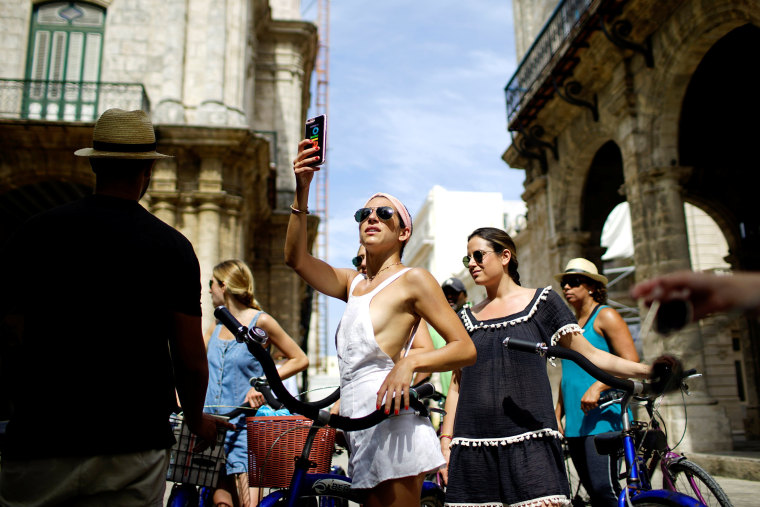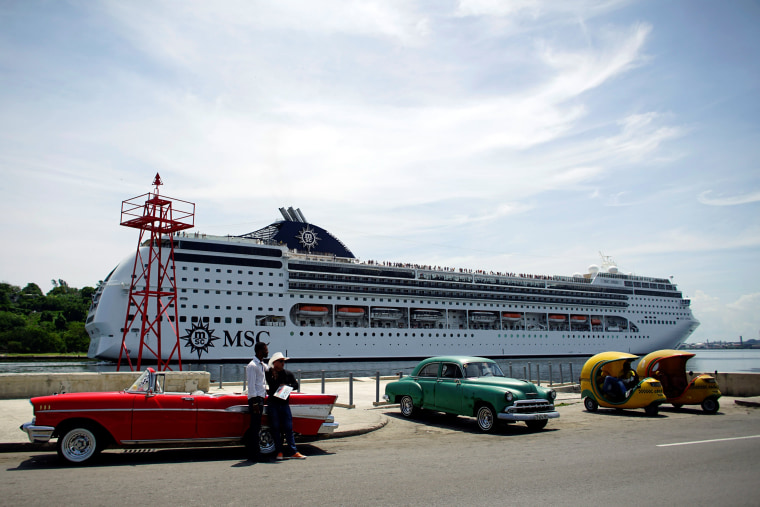Back in the day, politicians would breeze into Miami wearing a guayabera, eat a Cuban sandwich and promise to free our beloved island. But nothing happened — the Cuban revolution has survived the demise not just of the Soviet Union, but Fidel himself.
I was reminded of that last Friday. Speaking in a campy Cuban accent (“Havanaaaa!”), President Donald Trump announced he was “canceling Obama’s one-sided deal” and said it was “a very important moment for Cuba.” But rather than feel patronized or cynically manipulated, as they should have, his audience of well-heeled, octogenarian hardliners cheered. Also on stage was a beaming Sen. Marco Rubio, R-Fla., looking like one of their grandsons home from college.

As we Cubans say, "ño!" Trump gave a master class in con-artistry, but who was conned? Perhaps he himself was told that this was supported by most Cuban Americans. Actually, an Florida International University poll last year revealed that nearly 70 percent approved of President Barack Obama’s engagement with Cuba, and 63 percent opposed the embargo. The audience was duped into thinking that Trump would bring freedom to Cuba, and Little Marco, as Trump used to call the senator, was the biggest mark of all.
The speech didn’t offer many specifics, nor did the accompanying White House statement, though guidelines issued by the Treasury Department fill in the gaps. They make clear that the proposed changes will not go into effect for several months, after administrative rules are issued, which in Trumplandia is a lifetime.
RELATED: Freely Wandering in Cuba Gets Harder to Do Under Trump
But rather than cancel the “one-sided deal,” it actually strengthens it.
The keystone of Obama’s opening to Cuba was the normalization of relations with an exchange of ambassadors and embassies (which had previously been called “Interests Sections”). This was affirmed by Trump, as was Cuba’s removal from the list of state-sponsored terrorists, the elimination of Bush-era restrictions on Cuban family visits and remittances, and ending “wet foot, dry foot.”
So where’s the beef?
What’s new is the ban on doing business with GAESA, a conglomerate of companies controlled by the Cuban armed forces. Following the Chinese model, the military is deeply embedded in the Cuban economy and controls more than half of the tourism industry. This appears to have Rubio’s stamp, and I imagine a fresh-faced ideologue in a Senate conference room raising a hand to say, “Hey, why don’t we go after the army?”
But this is a return to the magical thinking that the nearly 60-year-old economic embargo would cancel the Castros. On my last trip to Havana, I saw American consumer products like Nike sneakers and cans of Coca-Cola sold openly.
It didn’t work then, and won’t work now.
GAESA has a stake in many of the hotels and tourist spots in Old Havana, including Hemingway’s favorite hangout, the Floridita. Presumably, American visitors would have to go elsewhere, say the Bodeguita del Medio (where Hemingway drank mojitos instead of daiquiris).
But how to untangle GAESA’s complex portfolio? We have no way of knowing which properties it actually controls, and no way to enforce this ban save having an FBI agent at the bar of the Floridita. Moreover, nothing prevents the Cubans from transferring these properties to other government entities not run by the military (surprise!).

This might be a boon for Airbnb, which offers 22,000 rentals throughout the island. But according to the Miami Herald, Airbnb payments are processed by another GAESA subsidiary, so it could be off limits as well.
The other change relates to travel. Tourism remains illegal, but Obama allowed Americans to self-declare that one of 12 approved categories applied to their trip. The broadest was “people-to-people,” which meant you were promoting friendly relations with Cubans, which is easy enough to do. For the past year, American travelers had no need to apply for permission to visit Cuba and could get their visas at the airline counter.
It will now be required for “people–to-people” travelers to join a licensed group, as before. But Americans can still self-declare for the other 11 categories, such as education, religious activities, and professional research.
Trump also boasted that his proposal would increase human rights in Cuba, which is curious given his bromance with the leaders of the Philippines, Saudi Arabia and Turkey, all egregious violators.
RELATED: Trump and Cuba: Crackdown, But No Breakup
But how will keeping American hipsters from going solo to Havana help dissidents?
Indeed, it will hurt nascent Cuban entrepreneurs, the cuentapropistas who rent out their apartments via Airbnb or run paladares, the often delicious home-style restaurants. These are thriving economic eco-systems (someone whose house is on Airbnb might hire a driver or housekeeper for guests) which bring cash to ordinary Cubans. But they rely upon self-declared travelers. For logistical reasons, a licensed group will probably stay at a government-run hotel.
Raul Castro is a chess player, and Obama shrewdly looked several moves ahead. His opening gambit was that the Cuban regime would grow vested in the benefits of normalization, and be encouraged to create a more open society.
I was among those who criticized Obama for his indifference to Cuban dissidents. His deal was brokered by Pope Francis, who on his visit preferred to meet with an ailing Fidel rather than the Ladies in White. In fact, several protesters were beaten up while Obama appeared on stage with Raul in Havana, just a few blocks away.
It’s too soon to tell whether Obama’s admittedly flawed approach will work, though over 614,433 Americans visited Cuba last year, including 329,496 Cuban Americans. It’s a bit tougher for Cuban authorities to harass dissidents when there’s an American family nearby spending dollars and taking selfies. Cubans now have easier access to the internet and stronger links to the outside world.
They’ve met more of us, and we’ve met more of them. To me, that’s progress.